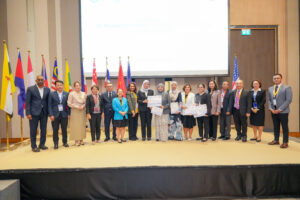Chemical Insights Research Institute Initiates Health Research to Understand the Dangers of Wildfire Smoke and How to Reduce Community Health Risks
Findings can help consumers, communities, and policy makers protect public health.
ATLANTA (Oct. 17, 2023) – Wildfires are growing in intensity and frequency, resulting in significant loss of life and property damage, as recently experienced in Maui. In addition, resulting air pollution exposure and residual toxic residues bring the potential of chronic health disease and contamination to soil and water systems. Chemical Insights Research Institute (CIRI) of UL Research Institutes is committing to significant research that will help understand the public health impact of wildfires and define steps for protecting the health and well-being of those affected.
Very little is known about pollutant exposures that people are experiencing in wildfires, especially those that occur in the wildland urban interface (WUI) where homes, buildings and even cars are burning along with the forest biomass. This type of fire leads to the release of unknown and complex chemical mixtures resulting from the interaction of synthetic building materials, plastics, fuels, rubber, metals, and even electric batteries.
“A typical home can add about 50 tons of fuel to a wildfire, releasing hundreds of chemicals and reactions products into the air and forming combustion residues that can infiltrate our buildings, soil, and water supplies,” according to Marilyn Black, Ph.D., vice president and senior technical and strategic advisor of CIRI. “We have a significant data gap in understanding what this pollution is and what the health impacts might be.”
To tackle the issue, CIRI is taking a two-pronged approach. Using its specialized in-house exposure and toxicology laboratories in Marietta, Ga., CIRI is developing techniques to characterize this complex pollution, measure human exposure levels and determine human toxicity through in vitro techniques or in vitro methods using human cells. CIRI’s unique capabilities of untargeted chemical analysis and dust characterization provide a crucial step forward in gathering critical data. Working alongside the US Environmental Protection Agency, Office of Research and Development, CIRI is currently collecting data in a 50-home study in wildfire-prone Tulare County, California. CIRI is analyzing the chemical makeup of smoke and completing toxicity assessments of settled smoke debris.
Simultaneously, CIRI is sponsoring research at three leading universities to help fill the knowledge gap and to evaluate procedures for reducing risks. Dr. Jim Zhang of Duke University’s Global Health Institute with researchers from the University of Southern California is studying the impact of wildfire smoke on cardio-metabolic effects. This intervention study is evaluating HEPA filtration as a means for reducing the risk of type 2 diabetes in residents of wildfire-prone Los Angeles.
At West Virginia University, CIRI’s sponsored research is characterizing particle and chemical emissions resulting from combustion of forest biomass with common building materials such as construction lumber and insulations. Inhalation exposure from combustion sources represents a significant challenge to public health.
Data from these studies will assist communities, homeowners, policy makers, and medical scientists in understanding the health impact of WUI fires and identifying actions for reducing their public health risks.
Learn more at Wildfires and the Wildland Urban Interface | Chemical Insights
About Chemical Insights Research Institute
Chemical Insights Research Institute (CIRI) of UL Research Institutes is a nonprofit organization dedicated to scientific research, publication, education, and communication on environmental exposures resulting from technologies and practices, their impact on human health, and processes for reducing health risks. CIRI provides actionable data and resources to help manufacturers, educators, healthcare providers, and consumers make informed environmental health decisions and risk reduction strategies for the protection of human health.
About UL Research Institutes
UL Research Institutes is a nonprofit research organization dedicated to advancing public safety through scientific discovery. Since 1894, our research has advanced our mission toward a safer, more secure, and sustainable future. Focused on global risks from fire mitigation and air quality to safe energy storage and digital privacy, we conduct rigorous independent research, analyze safety data and partner with experts to uncover and act on existing and emerging risks to human safety.
Discover more at UL.org.
Contact
Bert Kelly
Chemical Insights Research Institute
UL Research Institutes
Bert.Kelly@ul.org
1-470-957-7854
PUBLISHED









